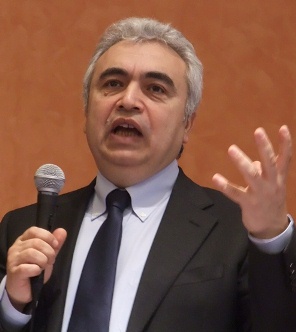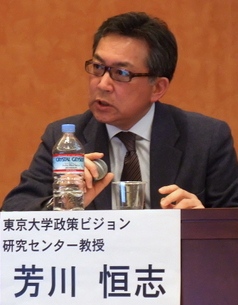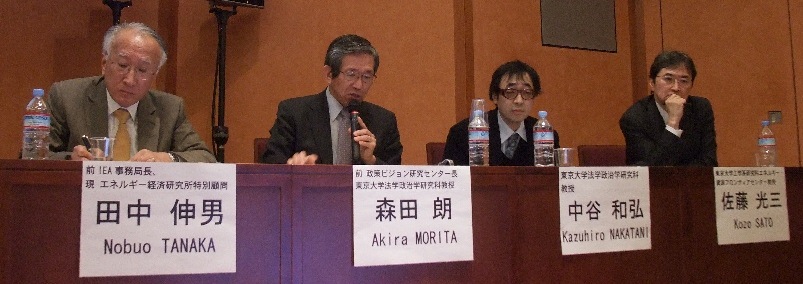The 1st Energy Policy Roundtable 2012 Report
Hisashi YoshikawaProfessor, UTokyo Policy Alternatives Research Institute (PARI) / Graduate School of Public Policy (GraSPP), the University of Tokyo
Feb. 21, 2012
日本語ページへ
The 1st Energy Policy Roundtable 2012 Program
Energy Policy Roundtable 2012
Basic Argument in a Global Context

| [Date] | Tuesday, February 21, 14:00-16:00 |
| [Venue] | Ito Hall (B2 floor), Ito International Research Center Map |
| [Hosted by] | UTokyo Policy Alternatives Research Institute (PARI) |
| [Co-hosted by] | Graduate School of Public Policy (GrasPP) |
Program
| 13:30 --Registration-- | ||
|---|---|---|
| 14:00 --Opening Remarks-- | ||
| Prof. Hideaki Shiroyama | Director of UTokyo Policy Alternatives Research Institute / Professor, Graduate School of Public Policy, the University of Tokyo | |
| 14:05-15:00 --Keynote Speech-- | ||
| Dr. Fatih Birol | Chief Economist of the International Energy Agency (IEA), Director of the World Energy Outlook (WEO) | |
| 15:00-15:40 --Panel Discussion-- | ||
| Panelists | ||
| Mr. Nobuo Tanaka | Global Associate for Energy Security and Sustainability at the Institute of Energy, Economics, Japan (IEEJ) / the former Executive Director of the International Energy Agency (IEA) | |
| Prof. Akira Morita | Former Director of UTokyo Policy Alternatives Research Institute (PARI), the University of Tokyo / Professor, Graduate School of Public Policy (GraSPP), the University of Tokyo | |
| Prof. Kazuhiro Nakatani | Professor, Graduate School of Public Policy (GraPP), the University of Tokyo | |
| Prof. Kozo Sato | Professor, Engineering for Sustainable Carbon Cycle Laboratory, the University of Tokyo | |
| 15:40-16:00 --Q&A-- | ||
| Moderator Prof. Hisashi Yoshikawa | Professor, Graduate School of Public Policy, the University of Tokyo / UTokyo Policy Alternatives Research Institute | |

Keynote Speaker : Dr. Fatih Birol
The 1st Energy Policy Roundtable 2012 was held on February 21st at Ito Hall. The event opened with a speech by Professor Hideaki Shiroyama, Director of the Todai Policy Alternatives Research Institute(PARI), followed by a keynote speech by Dr. Fatih Birol, Chief Economist of the International Energy Agency (IEA) and responsible for the World Energy Outlook publication.
The ensuing panel discussion was chaired by Prof. Hisashi Yoshikawa, Project Professor of the Graduate School of Public Policy, the University of Tokyo, and also a PARI member.
Panelists:
Nobuo Tanaka, Global Associate for Energy Security and Sustainability at the Institute of Energy Economics, Japan (IEEJ) and former Executive Director of the IEA.
Akira Morita, former Director of PARI, Professor of the Graduate School of Public Policy, the University of Tokyo.
Kazuhiro Nakatani, Professor of the Graduate School of Public Policy, the University of Tokyo.
Kozo Sato, Professor in the Engineering for Sustainable Carbon Cycle Laboratory, the Frontier Research Center for Energy and Resources, the Graduate School of Engineering, the University of Tokyo.
At our roundtable events, we aim to provide a global energy perspective. We invite world-leading energy specialists as keynote speakers and host a forum where Japan’s experts in energy and related fields may enter discussions with the invited speakers. Seminars will be held every 2 or 3 months for a total of 5 seminars in a year.

Moderator : Prof. Hisashi Yoshikawa
Looking for New Paths in Energy
The issues raised and discussed and conclusions reached at the 1st Roundtable were:
- Global energy is now facing unprecedented uncertainty. While there is growing concern regarding geopolitical changes, particularly in the MENA region, diversity in oil production and export is becoming smaller and smaller, resulting in an expected continuation of high oil prices. On the other hand, unconventional gas resources are now being rapidly developed. Looking at the global energy situation, emerging countries such as China, India and the ASEAN member states in particular are spurring rising demand. Thus, it seems the world is entering into a new era in terms of energy supply and demand.
- As regards policy making, in the light of these changes in the circumstances of global energy, there is growing concern over energy security. The center of gravity in energy security policy has been shifting from primary energy sources to electricity generation and cross-border electricity grids, while gas pipeline networks have also assumed growing importance. From the point of view of global governance, discussion has already started regarding future international frameworks. In addition, there is rising concern about energy transportation.
- Nuclear energy has made a substantive contribution to each of the 3Es: energy security, economic growth and the environment, but since Fukushima the role of nuclear energy has come under review in some countries. From the point of view of the 3Es, the greatest impact of lower nuclear output would be in countries with limited domestic energy resources.
- Considering ways to ensure energy security along with possible future environmental safety restrictions from a mid- and long-term perspective, it is important to develop technologies for energy efficiency, including clean coal and CCS, for a low-carbon society.
- Energy policy and the energy situation in Asia, especially in China, India and the ASEAN member states, will directly affect the energy situation and the 3Es in the rest of the world.
- Japan, first of all, should develop new safety regulation mechanisms and standards based on lessons learnt from the Fukushima nuclear power plant accident, sharing fully our knowledge and experience with the rest of the world. Secondly, new era energy policies, which should be both stable and flexible, should be established immediately in keeping with the global trend. In line with these goals, policy discussions based on comparable and transparent scientific knowledge should be conducted. As regards our relationship with other Asian countries, our contribution and cooperation should be based on our advanced technologies in energy efficiency for a low-carbon society, and on our experience in these fields.

Panel Discussion
(From left, Mr. Nobuo Tanaka, Prof. Akira Morita, Prof. Kazuhiro Nakatani, and Prof. Kozo Sato)
In the next roundtable, planned for the morning of April 20th, we will invite Prof. Chou Siaw Kiang, Executive Director, Energy Studies Institute (ESI), National University of Singapore. We will focus our discussion on energy in Asian region.


